Intro
Human chorionic gonadotropin (hCG) is a hormone produced during pregnancy that is made by the developing embryo after conception and later by the placental component syncytiotrophoblast. The level of hCG in a woman's blood and urine can be detected by a pregnancy test, and it plays a crucial role in maintaining the pregnancy. Understanding hCG levels is essential for monitoring the health of the pregnancy and detecting any potential complications early on.
The importance of hCG levels cannot be overstated, as they provide valuable insights into the development and progression of the pregnancy. hCG levels can indicate whether the pregnancy is progressing normally, if there are any potential issues, or if the pregnancy is at risk of miscarriage. Moreover, hCG levels can also be used to diagnose certain conditions, such as ectopic pregnancy or molar pregnancy. As such, it is essential to monitor hCG levels regularly during the early stages of pregnancy to ensure the best possible outcomes.
As women navigate the journey of pregnancy, they often have many questions and concerns about hCG levels. What are normal hCG levels during pregnancy? How do hCG levels change throughout the pregnancy? What do abnormal hCG levels indicate? These are just a few of the questions that women may have, and it is crucial to provide clear and concise answers to alleviate their concerns and empower them with knowledge. By understanding hCG levels, women can take a more active role in their pregnancy care and make informed decisions about their health and well-being.
Understanding hCG Levels
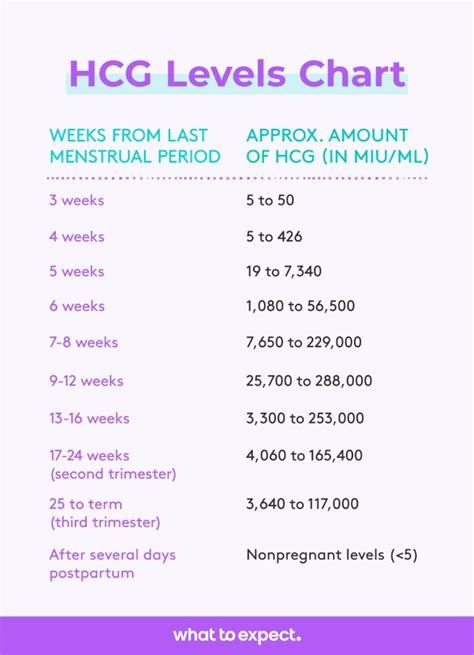
hCG levels are typically measured in milli-international units per milliliter (mIU/mL) of blood. The levels of hCG can vary significantly from woman to woman and even from one pregnancy to another. During the first trimester, hCG levels typically rise rapidly, often doubling every 48-72 hours. This rapid increase in hCG levels is essential for maintaining the pregnancy and supporting the growth and development of the embryo.
Normal hCG Levels
Normal hCG levels during pregnancy can vary widely, but here are some general guidelines: * 1-2 weeks after conception: 10-50 mIU/mL * 2-3 weeks after conception: 50-100 mIU/mL * 3-4 weeks after conception: 100-500 mIU/mL * 4-5 weeks after conception: 500-10,000 mIU/mL * 5-6 weeks after conception: 10,000-50,000 mIU/mL It is essential to note that these are general guidelines, and hCG levels can vary significantly from woman to woman.hCG Level Charts
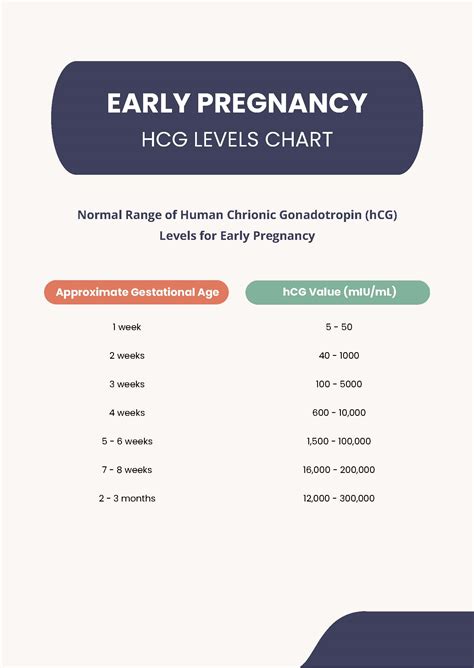
hCG level charts can be a useful tool for tracking hCG levels throughout the pregnancy. These charts typically plot the hCG levels against the number of weeks after conception, providing a visual representation of the changes in hCG levels over time. By using an hCG level chart, women can monitor their hCG levels and detect any potential abnormalities early on.
Interpreting hCG Level Charts
When interpreting hCG level charts, it is essential to consider the following factors: * The rate of increase: hCG levels should increase rapidly during the first trimester, often doubling every 48-72 hours. * The peak level: hCG levels typically peak around 10-12 weeks of gestation, with levels ranging from 50,000-200,000 mIU/mL. * The decline: After peaking, hCG levels typically decline gradually, reaching a stable level by the second trimester.Abnormal hCG Levels
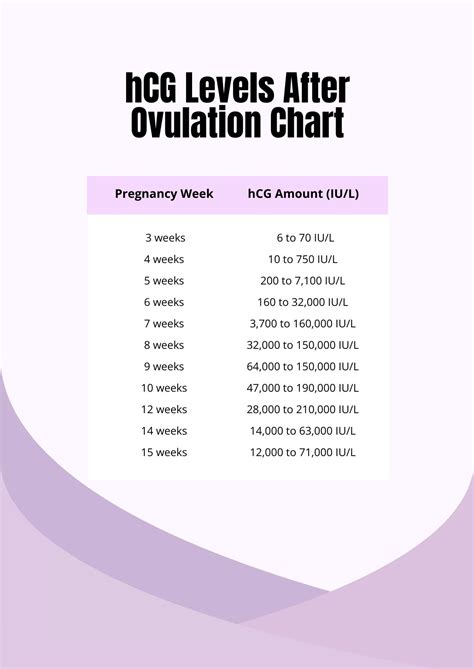
Abnormal hCG levels can indicate a range of potential issues, including ectopic pregnancy, molar pregnancy, or miscarriage. It is essential to monitor hCG levels regularly and seek medical attention if any abnormalities are detected.
Causes of Abnormal hCG Levels
Some common causes of abnormal hCG levels include: * Ectopic pregnancy: hCG levels may be lower than expected, and the rate of increase may be slower than normal. * Molar pregnancy: hCG levels may be higher than expected, and the rate of increase may be more rapid than normal. * Miscarriage: hCG levels may be lower than expected, and the rate of decrease may be more rapid than normal.hCG Levels and Pregnancy Complications
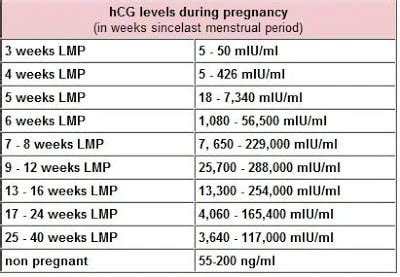
hCG levels can provide valuable insights into the health of the pregnancy and detect potential complications early on. By monitoring hCG levels regularly, women can reduce the risk of complications and ensure the best possible outcomes.
Pregnancy Complications and hCG Levels
Some common pregnancy complications that can be detected by abnormal hCG levels include: * Ectopic pregnancy: hCG levels may be lower than expected, and the rate of increase may be slower than normal. * Molar pregnancy: hCG levels may be higher than expected, and the rate of increase may be more rapid than normal. * Miscarriage: hCG levels may be lower than expected, and the rate of decrease may be more rapid than normal.hCG Levels and Multiple Pregnancies
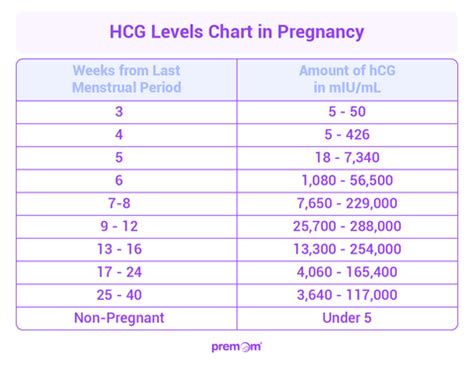
hCG levels can be affected by multiple pregnancies, such as twins or triplets. In these cases, hCG levels may be higher than expected, and the rate of increase may be more rapid than normal.
hCG Levels in Multiple Pregnancies
Some key factors to consider when interpreting hCG levels in multiple pregnancies include: * Higher hCG levels: hCG levels may be higher than expected in multiple pregnancies, due to the presence of multiple embryos. * More rapid increase: The rate of increase in hCG levels may be more rapid than normal in multiple pregnancies.Monitoring hCG Levels
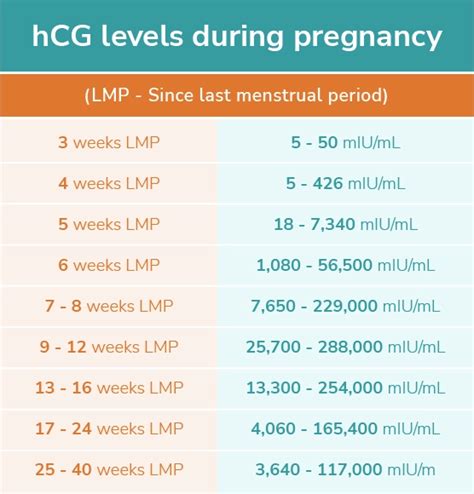
Monitoring hCG levels is essential for detecting any potential abnormalities and ensuring the best possible outcomes. Women should work closely with their healthcare provider to monitor hCG levels regularly and address any concerns or questions they may have.
How to Monitor hCG Levels
Some key steps for monitoring hCG levels include: * Regular blood tests: hCG levels should be monitored regularly through blood tests, typically every 48-72 hours. * Ultrasound scans: Ultrasound scans can provide valuable insights into the health of the pregnancy and detect any potential complications. * Communication with healthcare provider: Women should work closely with their healthcare provider to monitor hCG levels and address any concerns or questions they may have.Conclusion and Next Steps

In conclusion, hCG levels play a crucial role in maintaining the pregnancy and detecting any potential complications. By understanding hCG levels and monitoring them regularly, women can take a more active role in their pregnancy care and ensure the best possible outcomes. If you have any questions or concerns about hCG levels or pregnancy care, be sure to discuss them with your healthcare provider.
We invite you to share your thoughts and experiences with hCG levels and pregnancy care in the comments below. Your input can help other women navigate the journey of pregnancy and make informed decisions about their health and well-being. Additionally, feel free to share this article with anyone who may benefit from this information, and don't hesitate to reach out to us if you have any further questions or concerns.
What are normal hCG levels during pregnancy?
+Normal hCG levels during pregnancy can vary widely, but here are some general guidelines: 1-2 weeks after conception: 10-50 mIU/mL, 2-3 weeks after conception: 50-100 mIU/mL, 3-4 weeks after conception: 100-500 mIU/mL, 4-5 weeks after conception: 500-10,000 mIU/mL, 5-6 weeks after conception: 10,000-50,000 mIU/mL.
How do hCG levels change throughout the pregnancy?
+hCG levels typically rise rapidly during the first trimester, often doubling every 48-72 hours. After peaking around 10-12 weeks of gestation, hCG levels decline gradually, reaching a stable level by the second trimester.
What do abnormal hCG levels indicate?
+Abnormal hCG levels can indicate a range of potential issues, including ectopic pregnancy, molar pregnancy, or miscarriage. It is essential to monitor hCG levels regularly and seek medical attention if any abnormalities are detected.
